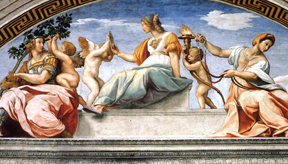
The University of Notre Dame Institute for Advanced Study (NDIAS) will host an international and interdisciplinary conference called “Dimensions of Goodness” April 4 to 6 in the Notre Dame Conference Center (McKenna Hall).
The event features 17 leading scholars and other experts from a wide variety of disciplines, including biomedicine, engineering, law, philosophy, political science, psychology and theology.
Each speaker will address a different question related to the subject of “the good”—including:
- How does interculturality challenge our moral ideas?
- What are the right politics for a developing country?
- What are the main challenges of modern medicine in the 21st century?
- What happens in our brain when we make a moral decision?
- What is Christianity’s contribution to ethics?
- What are the major changes in the history of our moral principles?
- How can international law limit the use of violence?
Presenters include Anita L. Allen, professor of philosophy and Henry R. Silverman Professor of Law at the University of Pennsylvania; Mexican economist Luis Ernesto Derbez Bautista; Richard Ernst, winner of the 1991 Nobel Prize in chemistry; and Notre Dame faculty members Mary Ellen O’Connell, Robert and Marion Short Professor of Law; Peter Kilpatrick, professor of chemical engineering and the McCloskey Dean of Engineering; Georges Enderle, the John T. Ryan Professor of International Business Ethics at the Mendoza College of Business, and Vittorio Hösle, Paul Kimble Chair of Arts and Letters and NDIAS Director.
A complete list of conference speakers, topics, and registration information is available on the institute’s website.
Goodness is one of the three major values—beauty, goodness, and truth—that inspire the interdisciplinary work of the institute, whose inaugural conference in 2010 focused on the nature of beauty.
“The intellectual enterprise of our time is characterized by ever more narrow specialization, and, while this is indispensable, we need a counteracting force that tries to reconnect the various disciplines,” Hösle says. “Only thus can the old questions (such as questions of beauty, justice or religion) reasonably be treated. The neglect of such questions will inevitably lead to a loss of meaning in the scientific quest.”
NDIAS supports research that is directed toward, or extends inquiry to include, ultimate questions and questions of value, especially as they engage the Catholic intellectual tradition. It encourages fellows to explore the relationship between the world as it is and the world as it should be, and to reflect on the broad questions that link multiple areas of inquiry.
Image: The Cardinal and Theological Virtues, a fresco by Raphael as part of his Stanza della Segnatura in the Palazzi Vaticani in Vatican City. Courtesy of the Vatican Museums.
Originally published by at al.nd.edu on February 11, 2011.